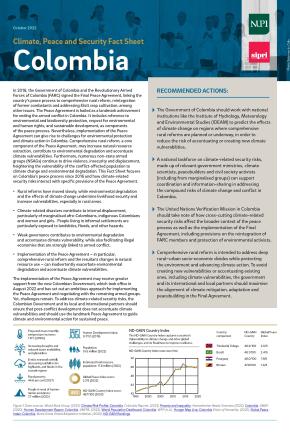Climate, Peace and Security Fact Sheet: Colombia (2022)

In 2016, the Government of Colombia and the Revolutionary Armed Forces of Colombia (FARC) signed the Final Peace Agreement, linking the country’s peace process to comprehensive rural reform, reintegration of former combatants and addressing illicit crop cultivation, among other issues. The Peace Agreement is hailed as a landmark achievement for ending the armed conflict in Colombia. It includes reference to environmental and biodiversity protection, respect for environmental and human rights, and sustainable development, as components of the peace process. Nevertheless, implementation of the Peace Agreement can give rise to challenges for environmental protection and climate action in Colombia. Comprehensive rural reform, a core component of the Peace Agreement, may increase natural resource extraction, contribute to environmental degradation and accentuate climate vulnerabilities. Furthermore, numerous non-state armed groups (NSAGs) continue to drive violence, insecurity and displacement, heightening the vulnerability of the conflict-affected population to climate change and environmental degradation. This Fact Sheet focuses on Colombia’s peace process since 2016 and how climate-related security risks interact with specific provisions of the Peace Agreement.



